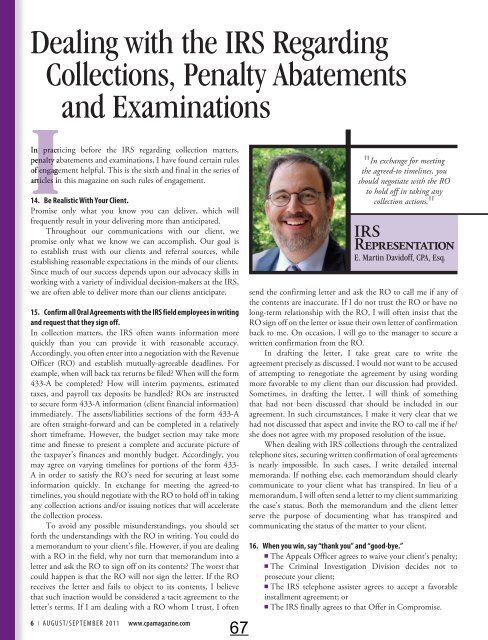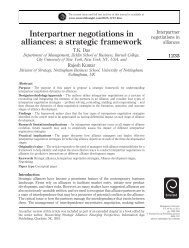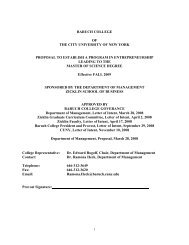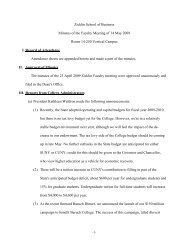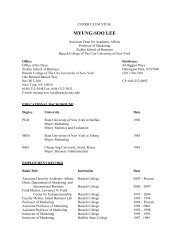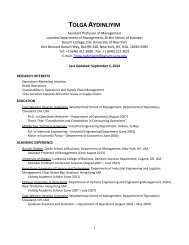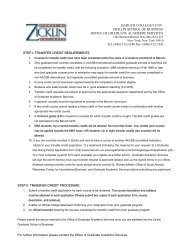Tax Seminar #3 – December 3 2012
Workbook - Zicklin School of Business
Workbook - Zicklin School of Business
Create successful ePaper yourself
Turn your PDF publications into a flip-book with our unique Google optimized e-Paper software.
Dealing with the IRS Regarding<br />
Collections, Penalty Abatements<br />
and Examinations<br />
In practicing before the IRS regarding collection matters,<br />
Ipenalty abatements and examinations, I have found certain rules<br />
Iof engagement helpful. This is the sixth and final in the series of<br />
Iarticles in this magazine on such rules of engagement.<br />
14. Be Realistic With Your Client.<br />
Promise only what you know you can deliver, which will<br />
frequently result in your delivering more than anticipated.<br />
Throughout our communications with our client, we<br />
promise only what we know we can accomplish. Our goal is<br />
to establish trust with our clients and referral sources, while<br />
establishing reasonable expectations in the minds of our clients.<br />
Since much of our success depends upon our advocacy skills in<br />
working with a variety of individual decision-makers at the IRS,<br />
we are often able to deliver more than our clients anticipate.<br />
15. Confirm all Oral Agreements with the IRS field employees in writing<br />
and request that they sign off.<br />
In collection matters, the IRS often wants information more<br />
quickly than you can provide it with reasonable accuracy.<br />
Accordingly, you often enter into a negotiation with the Revenue<br />
Officer (RO) and establish mutually-agreeable deadlines. For<br />
example, when will back tax returns be filed? When will the form<br />
433-A be completed? How will interim payments, estimated<br />
taxes, and payroll tax deposits be handled? ROs are instructed<br />
to secure form 433-A information (client financial information)<br />
immediately. The assets/liabilities sections of the form 433-A<br />
are often straight-forward and can be completed in a relatively<br />
short timeframe. However, the budget section may take more<br />
time and finesse to present a complete and accurate picture of<br />
the taxpayer’s finances and monthly budget. Accordingly, you<br />
may agree on varying timelines for portions of the form 433-<br />
A in order to satisfy the RO’s need for securing at least some<br />
information quickly. In exchange for meeting the agreed-to<br />
timelines, you should negotiate with the RO to hold off in taking<br />
any collection actions and/or issuing notices that will accelerate<br />
the collection process.<br />
To avoid any possible misunderstandings, you should set<br />
forth the understandings with the RO in writing. You could do<br />
a memorandum to your client’s file. However, if you are dealing<br />
with a RO in the field, why not turn that memorandum into a<br />
letter and ask the RO to sign off on its contents? The worst that<br />
could happen is that the RO will not sign the letter. If the RO<br />
receives the letter and fails to object to its contents, I believe<br />
that such inaction would be considered a tacit agreement to the<br />
letter’s terms. If I am dealing with a RO whom I trust, I often<br />
6 I AUGUST/SEPTEMBER 2011 www.cpamagazine.com<br />
67<br />
In exchange for meeting<br />
"<br />
the agreed-to timelines, you<br />
should negotiate with the RO<br />
to hold off in taking any<br />
collection actions. "<br />
IRS<br />
REPRESENTATION<br />
E. Martin Davidoff, CPA, Esq.<br />
send the confirming letter and ask the RO to call me if any of<br />
the contents are inaccurate. If I do not trust the RO or have no<br />
long-term relationship with the RO, I will often insist that the<br />
RO sign off on the letter or issue their own letter of confirmation<br />
back to me. On occasion, I will go to the manager to secure a<br />
written confirmation from the RO.<br />
In drafting the letter, I take great care to write the<br />
agreement precisely as discussed. I would not want to be accused<br />
of attempting to renegotiate the agreement by using wording<br />
more favorable to my client than our discussion had provided.<br />
Sometimes, in drafting the letter, I will think of something<br />
that had not been discussed that should be included in our<br />
agreement. In such circumstances, I make it very clear that we<br />
had not discussed that aspect and invite the RO to call me if he/<br />
she does not agree with my proposed resolution of the issue.<br />
When dealing with IRS collections through the centralized<br />
telephone sites, securing written confirmation of oral agreements<br />
is nearly impossible. In such cases, I write detailed internal<br />
memoranda. If nothing else, each memorandum should clearly<br />
communicate to your client what has transpired. In lieu of a<br />
memorandum, I will often send a letter to my client summarizing<br />
the case’s status. Both the memorandum and the client letter<br />
serve the purpose of documenting what has transpired and<br />
communicating the status of the matter to your client.<br />
16. When you win, say “thank you” and “good-bye.”<br />
■ The Appeals Officer agrees to waive your client’s penalty;<br />
■ The Criminal Investigation Division decides not to<br />
prosecute your client;<br />
■ The IRS telephone assister agrees to accept a favorable<br />
installment agreement; or<br />
■ The IRS finally agrees to that Offer in Compromise.


